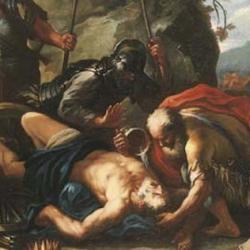As soon as David becomes king (1 Chronicles 13), he wants to bring the ark of God into Jerusalem (1 Chronicles 14). His plan comes to an abrupt halt when Yahweh kills Uzza fir stretching out a hand to touch the ark. The ark disappears from view for a chapter, and then David successfully brings the ark into the city in 1 Chronicles 16. One suspects a chiasm. One is not disappointed.
A. First attempt to transport the ark, 1 Chronicles 13:1-14
B. David’s house, 14:1
C. David’s exaltation, 14:2
D. David’s sons in Jerusalem, 14:3-7
E. Two victories over Philistines, 14:8-16
C’. David’s name goes out, 14:17
B’. David’s house, 15:1a
D’. List of Levites, 15:1b-10
A’. Second attempt to transport the ark, 15:11-29
The D/D’ sections are anomalous, and perhaps should be incorporated into other sections: David’s sons included in C and the list of Levites included in A’.
In any case, the victories over the Philistines stand between David’s attempts to bring God’s throne into Jerusalem. David doesn’t erect a tabernacle for Yahweh until Yahweh has defeated David’s enemies. He breaks through against Philistia in the valley of Rephaim, and then leads David into battle when the Philistines return. Both victories belong to Yahweh, though the effect is to exalt the name of David (14:17). Only when Yahweh has won His victories does He take His Sabbath throne above the cherubim. It’s a movement of gracious humility. First Yahweh exalts and established David’s kingdom; then the meshiach David establishes Yahweh’s throne. First the Son is enthroned at the Father’s right hand; one day, God will be all in all.
The key to David’s victories is prayer. He asks and seeks Yahweh before each battle (14:10, 14). Each time the Chronicler uses the verb sha’al, the basis for the name Saul (sha’ul). David proves a better Saul than Saul; Saul was the asked-for king who did not ask God or seek Him (10:13-14), while David is the king who asks God for help. David is contrasted to Saul also in the fact that he is “highly” exalted (14:2). The Hebrew word is taken from the verb ‘alah (ascend) and the specific form is ma’al. Saul too is associated with ma’al, but in his case it means “transgression” or “act of unfaithfulness” (10:13).
William Johnstone (1 & 2 Chronicles, 176) points out a further riff on the passage. The name of Hiram, king of Tyre, is “related to the root of herem, ‘devoted thing,’” and would have been understood by the Chronicler’s readers as a “devoted one.” Hiram fulfills the demand placed on Israel, “the absolute requirement on Israel to devote to God everything that is due to him. Huram, the ‘righteous Gentile,’ does just that.” Gentiles are going to be herem one way or another: They may, like the Canaanites, be subjected to the ban, the war of utter destruction, or they may subject themselves utterly to the God of Israel. They are devoted to God either way, as Paul indicated when he described himself as a priest offering the Gentiles to God (Romans 16).















